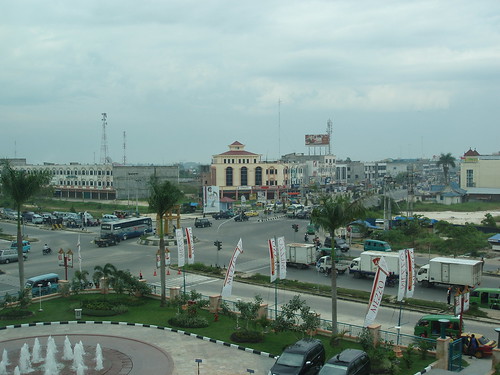
Yep, that sounds about right. Which totally explains why I'm still in school at 10.31pm. Making up for lost time.
Ruminations a Geography Grad Student studying food systems for sustainable cities

"From Singapore, the default route is Singapore-Batam-Pekanbaru-Bukittinggi. From Singapore, take a ferry from the World Trade Centre to the Sekupang terminal on the island of Batam. A variety of companies run mostly super-modern ferries which leave every few minutes from around 0730 until around 2130. The crossing takes about 40 minutes, and gets you in to Sekupang about 20 minutes before you left Singapore, since there's an hour's time difference between Singapore (GMT +8) and Western Indonesia (GMT +7). If you're aiming for an immediate onward connection out of Batam, you'd be well advised to take the first ferry out of Singapore, which will pretty much guarantee an immediate connection. Once you've cleared Indonesian immigration and customs in Sekupang, step out of the terminal and turn right, avoiding the touts who will inevitably pounce on you, and head for the domestic terminal right next door. Most or all boats to Pekanbaru leave between 0800 and 0900. Basically there are two ways of getting from Sekupang to Pekanbaru. Since 2003, there are one or two direct boats, which go up the Siak river all the way to Sungai Duku, the boat terminal just outside Pekanbaru. The "older" route involves a boat to Buton, which is just a transfer point on the Sumatran mainland, from which a bus takes you to Pekanbaru, all on the same ticket. Either route is fine, though if you have a choice, the direct boats are more convenient plus the river trip is quite pretty. Whichever route you take, you can expect to get in to Pekanbaru around 1600 - 1800. A word of warning: if you choose to sit on the rooftop to enjoy the view, be sure to cover your head, however overcast and cool you may think it is. The tropical sun can shine through both clouds and hair, and fry the top of your head without your noticing until it is too late.
From Pekanbaru to Bukittinggi, the heavily travelled road trip takes 4-6 hours. Ordinary busses leave from the central bus terminal called Loket. If you arrive in Sungai Duku, a taxi to Loket should cost you 20,000 Rps (about 2 Euros), and a shared oplet (minibus) much less. If you're coming from Buton, ask to be let off at Loket. Most of the busses are night busses, so, if you so desire, you should be able to make an immediate onward connection. Some of the night busses have the rather irritating habit of stoping in the middle of nowhere for a few hours, in order for you to arrive in Bukittinggi at the crack of dawn rather than at, say 0200.
Alternatively, just about any taxi or oplet driver anywhere in town, including those at Sungai Duku, will be happy to drive you directly to your hotel in Maninjau, at any time of the day or night. The "official" rate for the journey is 500,000 Rps (about 50 Euros), but with bargaining you might be able to talk your driver down to 400,000 Rps, or even less, if the vehicle is sufficiently dingy. If you're travelling in a group, this can work out quite economical. There are some spectacularly good roadside Padang restaurants along the way; ask to stop at one (and it's customary to pay for your driver's food and drink)."

"Pekanbaru is the capital of Riau, a province in Indonesia on the island of Sumatra. It has an area of 446.5 km² and population of over 793,000. Located on the Siak River, which drains to the Strait of Malacca, Pekanbaru has direct access to the busy strait and was long known as a trading port (the city name is derived from the Indonesia words of 'new market', "pekan" meaning market, and "baru" meaning new). It is the home of Element One team member Renaldo Rasfuldi.The city also has a website but is not particularly informative.
A settlement has existed on the city site since the 17th century. In the late 19th century, the city developed to serve the coffee and coal industries, and the Dutch built roads to help ship goods to Singapore and Malacca (now Melaka). After oil was discovered in the region in the 1930s, Pekanbaru's economy has depended heavily on oil revenues and made the city with the highest per capita income in Indonesia.[citation needed] Most of Indonesia's petroleum is produced in Riau, and much of Pekanbaru's economy is based on the petroleum industry. International oil companies, such as Chevron from US, as well as other Indonesian companies, have established their offices in the region. This location for oil has proven to be one of the best money providers in the world. However, the local government being so currupt, the US company Chevron only receives 10% of all the money made at the camps. The The city is connected by road to an oil refining and exporting port at Dumai. Many facilities, including an airport, three stadiums (buildig a fourth), swimming pool, one of the two bridges that cross the Siak River near the city, the roads in Rumbai area, and also the road to Dumai, were partially or fully financed by oil companies working in the area." - source: wikipedia